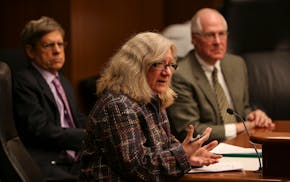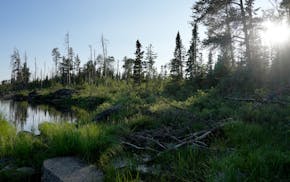Opinion editor's note: Strib Voices publishes a mix of commentary online and in print each day. To contribute, click here.
•••
It's easy with the passage of time to forget how deeply unsettling the fall of 2008 was. Wall Street was in meltdown, the housing market was in chaos, Congress was grappling with a big-banks bailout and a presidential election was coming to a close.
That makes what Minnesotans did that year all the more remarkable. In the teeth of a recession and amid all the uncertainty, Minnesotans voted their values. They approved the Clean Water, Land and Legacy Amendment, which raised the state sales tax and dedicated the revenue to investing in natural resources as well as arts and culture.
This November, Minnesotans will be asked to vote their values again on another conservation-minded constitutional amendment. If approved, it will extend a different funding stream — one established in 1988 — to protect and invest in the great outdoors. This revenue doesn't come from a sales tax. Instead, the state lottery generates these dollars.
The Minnesota Secretary of State's office has the actual language voters will see: tinyurl.com/MNballotmeasure2024. Those who vote yes will ensure that no less than 40% of lottery proceeds continue going into the state's Environment and Natural Resources Trust Fund (ENRTF) through Dec. 31, 2050.
Many of Minnesota's best-known conservation groups are backing the 2024 measure to renew the ENRTF's lottery funding stream, which will expire in 2025 if voters don't extend it. The advocates' support is understandable. Over the decades, lottery proceeds have provided more than $1 billion for more than 1,600 environmental projects around the state.
Coverage of the 2024 measure suggests there's little opposition to it. This is a state that's home to incredible natural resources. The Boundary Waters. The Mississippi, one of the world's marquee rivers. Southeast Minnesota's breathtaking bluffs. Ten thousand lakes, as our license plates proclaim.
Who could be against protecting these amazing assets? Especially with so much work left to do yet to safeguard them from longstanding threats, such as agricultural runoff. And new ones, such as invasive species or "forever chemicals."
While the Minnesota Star Tribune Editorial Board will not offer political endorsements in the November general election, which includes weighing in on the lottery environmental funding extension, I hope voters will support it. But my own journey on amendments like this suggests there's more complexity than might first meet the eye.
Back in 2008, the editorial board, of which I'm still a member, was a lonely voice in opposing the Legacy Amendment sales tax increase for the environment.
"Passing a constitutional amendment that dedicates funding subverts another of our valuable assets: good governance, via representative democracy," wrote Lori Sturdevant, now retired, in an Oct. 19, 2008, editorial.
"If the amendment is successful, it increases the likelihood that other worthy causes will line up to try to circumvent the legislative process and appeal directly for funding. This could result in the kind of government gridlock experienced in states such as California. And it would give elected officials less flexibility to address budgetary challenges in areas such as education and public safety."
In the 16 years since then, these fears have not come to fruition, though care remains essential in carving out further dedicated funding. It's also obvious that the Legacy funds and the lottery's dedicated dollars for the environment have done enormous good.
Recent Star Tribune news coverage reports that projects funded with lottery dollars include the Superior Hiking Trail, the University of Minnesota's Raptor Center, the National Loon Center, the reintroduction of bison at three public parks and concerted efforts to thwart invasive species.
Over the years, I've particularly appreciated scientific research investments greenlighted by the 17-member group that evaluates projects seeking to tap the lottery's ENRTF funds. The group is known as Legislative-Citizen Commission on Minnesota Resources.
For example, lottery proceeds have played a vital role in establishing invasive species research centers at the University of Minnesota. The Minnesota Aquatic Invasive Species Research Center has received six appropriations since 2012, totaling $26 million, according to state officials. The Minnesota Invasive Terrestrial Plants and Pests Center has received seven appropriations since 2014, totaling nearly $32 million in funding.
This robust funding stream has helped attract top researchers to Minnesota, said Rep. Rick Hansen, DFL-South St. Paul, in an interview. That commendably puts Minnesota on the leading edge of the fight to protect natural resources in Minnesota and around the world.
Lottery trust fund dollars have also funded valuable research into pollinators and threats posed to them by herbicides and pesticides.
Initiatives like this would have a hard time competing for funding during the traditional legislative appropriations process. That's just a reality when lawmakers are budgeting for the entire state. Research projects would have to compete against education, public safety and health care needs.
A "yes" vote on the measure would also lead to some updates in how dollars from the trust fund are used. There would be clear restrictions on using the funds for "the construction, repair, improvement, or operation of any facility or system that processes wastewater," though dollars could still fund wastewater research, which could better enable treatment plants to remove PFAS chemicals or other emerging pollutants.
Without restrictions, Hansen said the state's vast sewage infrastructure needs would leave no funding for anything else. Legislators have other options, such as bonding bills, for wastewater needs.
Another change: The percentage of dollars drawn yearly from the ENRTF would rise from 5.5% to 7%. The extra dollars would support a new community grant program intended to help smaller groups compete for project funding.
This is a responsible constitutional amendment, one that will ensure generations to come can enjoy the state's natural resources. I'll vote yes on Nov. 5.

Fierce but compassionate mental health advocate will be missed
Burcum: 'Big Beautiful Bill' takes hatchet to health care
Burcum: 'Why would we make it harder to get help' for addiction?
!["Republicans want to overturn this newfound eligibility [for undocumented immigrants to enroll in MinnesotaCare], which was passed by DFL majorities i](https://arc.stimg.co/startribunemedia/XZLGO62KH5G6DHR55ER5IECZAY.jpg?h=91&w=145&fit=crop&bg=999&crop=faces)
Burcum: Don't rush the decision on undocumented immigrant health coverage


